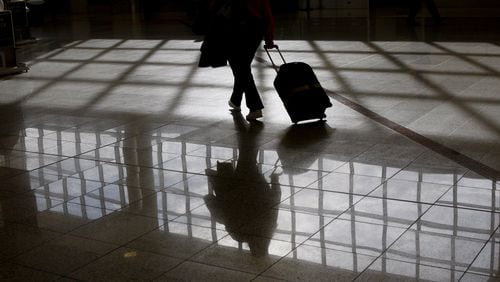Did Delta Air Lines and AirTran Airways collude to charge baggage fees to passengers? That’s the central question in an epic class-action suit that has, since it was filed in 2009, featured questionable conduct by Delta, engaged more than 40 lawyers, created a mountain of paper and has increasingly exasperated a federal judge.
And the answer to that central question is little closer than it was six years ago.
U.S. District Court Judge Timothy Batten this week ordered Delta to pay $2.7 million in sanctions for failing to turn over evidence — and that’s after more than $4.7 million in sanctions for earlier “discovery” violations. Discovery is the legal process by which one side turns over evidence to the other during a lawsuit.
Batten observed in his lengthy order that the case had devolved into “litigation about litigation” and been “derailed by ‘discovery on discovery.’” He also suggested that Delta had behaved “in an Inspector Clouseau-like fashion.”
The long-running case involves over-confident lawyers, broken promises, a whistleblower at Delta, an unmarked box of tapes stuffed in a locker, federal investigations, deleted e-mails, attorneys billing $600 an hour, a big-name lawyer appointed as special master and multiple sanctions.
And neither side has even reached the point yet of arguing the merits of the case.
“You just never want to hear it, that things are so bad, that discovery went so poorly, or that one side was so uncooperative that it had to get to his,” said Lynn Frances Jae, a marketing expert and consultant on eDiscovery, which is the exchange of electronic data in a lawsuit or investigation.”It’s supposed to be about helping people uncover the facts so you can have a speedy resolution to the case — but that’s not even close.”
On Wednesday, in a big step in the case, Batten granted the plaintiffs’ motion to certify the suit as a class action. The airlines are expected to appeal that ruling.
Baggage fee collusion claims
The lawsuit first filed in 2009 by plaintiffs’ attorneys representing airline passengers claimed AirTran invited Delta to collude on charging a first bag fee by signaling that it wanted to charge the fee if Delta acted first — and that Delta accepted the invitation.
Baggage fees are now commonplace.
Back in 2008, however, then-AirTran CEO Bob Fornaro said during an analyst conference call on the company’s financial results that AirTran had chosen not to start charging a first bag fee “primarily because our largest competitor in Atlanta” had not done it.
Delta announced its first checked bag fee a couple of weeks after the conference call, and was quickly matched by AirTran. (Southwest Airlines since acquired AirTran.)
In early 2009, the U.S. Justice Department launched an investigation into the baggage fee matter, a move followed by several lawsuits that were eventually consolidated into one massive case in federal court in Atlanta.
So far, the case has involved more than 40 attorneys.
Delta made ‘colossal blunders’ on discovery
The lawsuit’s tumultuous discovery phase lasted nearly five years past its original deadline.
The discovery phase ultimately raised so many issues that Judge Batten appointed a special master — Bruce Brown, the attorney who represented Georgia in the multi-state water wars case — to sort it out.
Brown wrote in his final report to the court that Delta made “colossal blunders” in producing documents.
Initially, attorneys representing Delta had vehemently assured the court that they had turned over all documents requested.
Yet just days later, “it became clear that Delta’s rhetoric was far removed from reality,” according to Batten’s order.
‘Ineffective, inefficient, inept … Clouseau-like’
While Delta was turning over documents in the case, the Justice Department found that some relevant documents had been turned over in one investigation but not in the baggage fee matter.
It turned out that Delta’s computer security and investigative response team — known as CSIRT — had not uploaded copies of hard drives as instructed by Delta’s legal team.
Then, the judge’s order reads, “Delta discovered a previously unknown box of server backup tapes in what can hardly be described as an inconspicuous location: CSIRT’s ‘Evidence Locker.’ Really.”
Even more backup tapes turned up later.
Delta had more missteps in its eDiscovery process. After receiving notice of the federal investigation, the company waited months before telling IBM, its contractor for backing up email servers, to stop overwriting server backup tapes. It also waited too long before moving employee e-mail evidence to a separate server to prevent them from being deleted.
“Delta’s discovery practices have time and and time again been shown to be ineffective, inefficient and inept. Throughout this litigation, Delta’s left hand has not known what its right hand was doing,” Batten wrote, quoting a judge in another case as saying, “It oftentimes appears that this litigation was conducted in an Inspector Clouseau-like fashion.”
‘Penalize or deter Delta’s abusive conduct’
A Delta employee, Kelly Turner Brown, who had led the company’s CSIRT team, was interviewed for the case.
At first she said she did not know whether Delta concealed evidence, then later said she thought Delta had intentionally withheld information and let data be destroyed.
She later contacted plaintiffs attorneys claiming she had more documents.
But Brown, the special master, found there was insufficient evidence that Delta acted in bad faith. He still recommended more than $1.8 million in sanctions against Delta to compensate plaintiffs attorneys for their extra time and expenses and to deter future misconduct.
The special master had recommended lesser sanctions against the airline, in part because a large portion of the fees were based on the higher hourly rate of the partners — some billing about $600 an hour — representing the plaintiffs, and not the partners’ lower-paid associates. But Batten said the special master was “too generous to Delta” and he ordered even great sanctions to “penalize or deter Delta’s abusive conduct.”
‘As maddening as Sisyphus’s efforts’
“Without question, it is Delta’s ineptitude and missteps that have caused the vast majority of the excessive time, expenses and energy that the parties have expended in discovery for the last five years,” the judge wrote in his order this week.
“Delta’s discovery misconduct has rendered the court’s attempts to manage this litigation and move it toward a resolution on the merits as futile and maddening as Sisyphus’s efforts to roll his boulder to the top of the hill.”
Delta declined to comment on the case, as it is ongoing litigation.
Batten, for his part, wrote: “It is time for the parties’ efforts and resources to turn to the merits of the case, a rare issue on which all parties agree.”
About the Author







